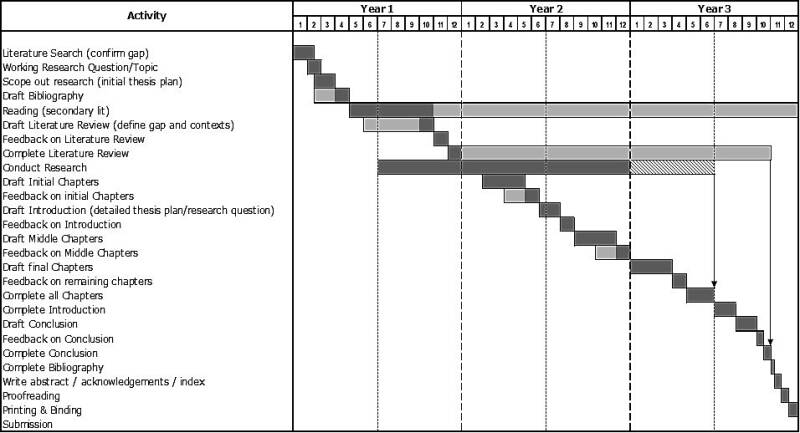The following guidance has been created for you by the Student Learning Advisory Service, for more detailed guidance and to speak to one of our advisers, please book an appointment or join one of our online workshops.
How is postgraduate different to undergraduate study?
Postgraduate study includes both Masters and Doctoral Research courses. Masters can be taught or research-based, while Doctorates (PhDs) are purely based on research. There are key differences between postgraduate-level and undergraduate-level study:
- Specialisation – while undergraduate study tends to cover breadth of subject (e.g. English Literature), postgraduate-level study tends to focus on a specific topic in-depth (e.g. a particular genre or historical context within English Literature).
- Emphasis on self-directed study – Large-group teaching is less frequent at Masters-level and does not exist for PhDs; instead there is a much greater emphasis on self-directed study. Consequently, there are fewer contact hours in postgraduate study than in undergraduate programmes. For PhD students, this contact time usually comprises meetings with your supervisor to discuss the process of your doctoral thesis.
- Emphasis on independent and more advanced research skills - (see Postgraduate Research & Dissertations).
Taught masters study
Taught masters builds on the skills you have
already begun to develop at undergraduate-level. Generally taught masters
programmes:
- consist of modules taught by a lecturer (see module catalogue: https://www.kent.ac.uk/courses/modules#postgraduate), requiring you to attend lectures and seminars, and complete assignments.
- require the focus of assignments to be more in-depth and specialised than those at undergraduate-level.
- involve more extensive and advanced reading.
- require a high degree of engagement with and contribution to seminar discussions.
- involve some form of research training component leading to an extended individual research project or dissertation to conclude the course.
Masters-level dissertations vary widely from programme to programme, but you can expect to write around 15,000 words. The process involves:
- developing a focused enquiry into an aspect of your subject, with clear parameters.
- developing a rigorous scholarly methodology to research it.
- a convincing approach to analysis of a range of material that collectively develops and supports an argument.
- developing a sophisticated awareness of existing scholarship relevant to your topic.
- developing a clear case for your contribution to ongoing debates.
The dissertation is an opportunity to draw upon the aptitude for self-directed study and critical thinking you have developed, together with the research training you will have received and will be good preparation should you be considering progressing to PhD research.
Doctoral (PhD) students
A PhD is a postgraduate doctoral degree, awarded to
students who complete an original thesis offering a significant new
contribution to knowledge in their subject. PhD qualifications are available in
all subjects and are normally the highest level of academic degree a person can
achieve. Although a PhD is a pure research degree it is, in fact, a diverse and
varied qualification with many different components. A typical PhD normally
involves:
- carrying out a literature review.
- conducting original research and collecting your results.
- producing a thesis that presents your conclusions.
- defending your thesis in an oral viva voce exam.

However, very few PhD experiences are just about researching and writing up a thesis. You are also likely to do some (or all) of the following during your PhD:
- Teaching
- Conference presentations
- Publications
- Public engagement and communications
These experiences will be an important part of your development as a researcher and academic and will enhance the value of your PhD regardless of your career plans.
Academic skills for postgraduate study
The Student Learning Advisory
Service (SLAS) provides students with support in making the transition into
Postgraduate study, particularly in developing the academic skills required for
you to succeed in your Postgraduate degree. This includes:
- Getting the most from lectures, seminars and supervision.
- Academic reading and criticality.
- Using research to develop and support ideas.
- Referencing.
- Planning and developing a written assignment e.g. research or project proposal, report, academic paper, literature review, thesis.
- Understanding specific principles of maths and statistics, from basic to advanced.
- Presenting ideas using both visual and verbal approaches.
- Research methods e.g. developing questionnaires, surveys and interview schedules.
- Linguistic development for different purposes and audiences.
- Managing multiple
projects and responsibilities.
and much more…
Visit the Student Learning Advisory Service (SLAS) for help throughout your Postgraduate study.
Source: Find A Masters (2019). Differences Between Undergraduate and Postgraduate Study. Available from: https://www.findamasters.com/advice/doing/undergraduate-postgraduate-differences.aspx [Accessed 28 August 2019].
Source: Find A PhD (2019). What is a PhD? Available from: https://www.findaphd.com/advice/finding/what-is-a-phd.aspx [Accessed 28 August 2019].





